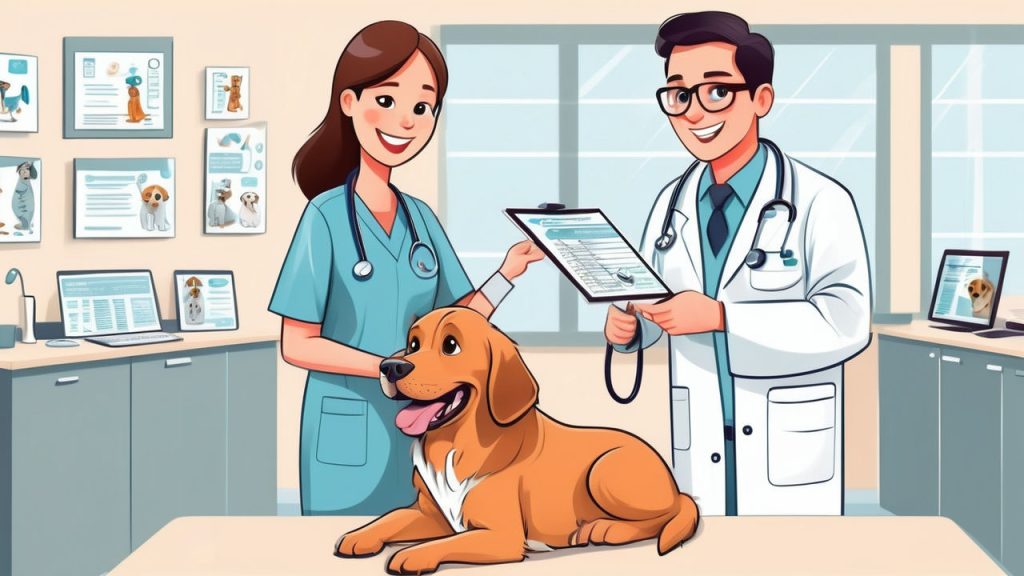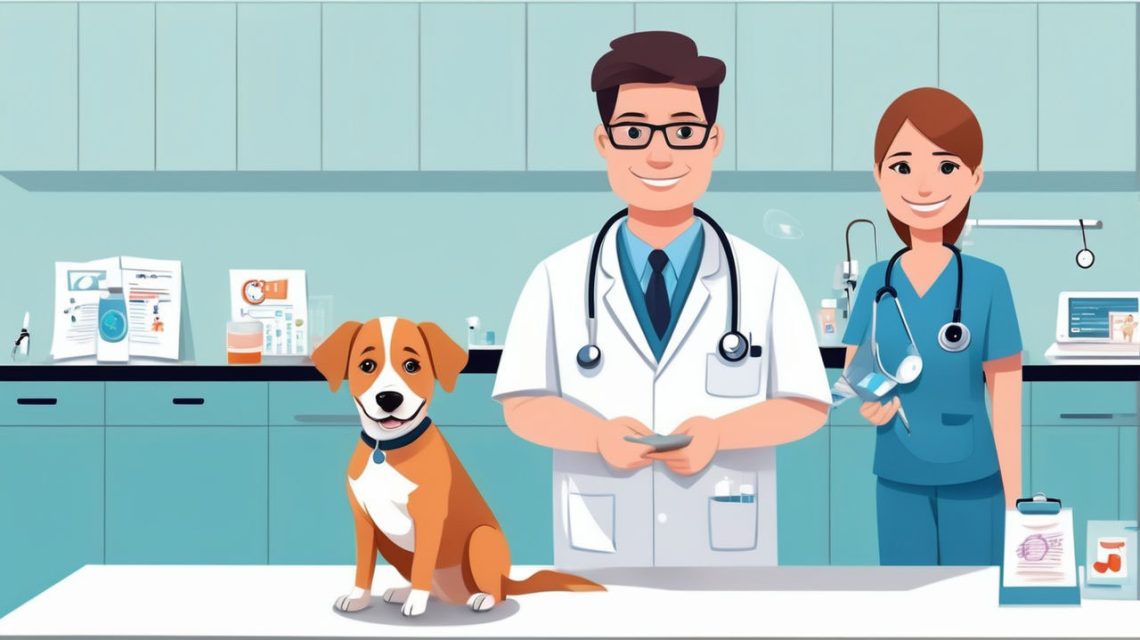Dog Annual Check-Up: Ensure Your Pet’s Health Yearly
Regular veterinary care is an essential part of keeping your dog healthy and happy. Among the most important visits is the dog annual check-up, a yearly appointment that helps monitor your pet’s overall well-being. Even if your dog seems perfectly healthy, this routine exam plays a crucial role in identifying potential health issues before they become serious. From vaccinations to weight management, these visits are key to ensuring your dog’s long-term health.
In this article, we’ll explore why annual check-ups are important, what to expect during the exam, and how this proactive care can add years to your dog’s life.
Why Dog Annual Check-Ups Are Crucial
Just like humans, dogs can develop health issues that may not show obvious symptoms right away. Regular check-ups give veterinarians the opportunity to detect problems early and address them before they become more difficult (and expensive) to treat. Additionally, routine care helps keep your dog’s vaccinations up to date, protecting them from preventable diseases.
1. Preventing Serious Health Problems
An annual check-up allows your vet to detect early signs of illness, such as heart disease, diabetes, or kidney problems. By catching these issues early, treatment can start before the condition worsens, improving your dog’s chances of recovery and reducing the need for costly interventions later on.
- Tip: Dogs often hide discomfort or pain, so don’t rely solely on outward signs to gauge their health. Regular vet visits can uncover hidden problems.
2. Monitoring Weight and Diet
Obesity is a common issue in dogs and can lead to serious conditions like diabetes, joint pain, and heart disease. During the annual check-up, your vet will assess your dog’s weight and body condition. If your dog is overweight, the vet will offer guidance on diet and exercise to get them back on track.
- Tip: Ask your vet for specific feeding recommendations based on your dog’s breed, age, and activity level to ensure they maintain a healthy weight year-round.
3. Updating Vaccinations
Vaccinations are a key part of protecting your dog from dangerous diseases like rabies, distemper, and parvovirus. During the annual check-up, your vet will review your dog’s vaccination records and administer any necessary booster shots to keep their immunity strong.
What Happens During a Dog Annual Check-Up?
Your dog’s annual check-up is a thorough exam that covers all aspects of their health. From physical assessments to diagnostic tests, this visit helps ensure your dog is in good condition and catches any potential problems before they become serious.
1. Full Physical Examination
The vet will begin by performing a head-to-tail physical exam, checking your dog’s ears, eyes, mouth, skin, and coat for any signs of infection, irritation, or other abnormalities. They will also listen to your dog’s heart and lungs, feel the abdomen for any irregularities, and assess the joints and muscles for signs of pain or stiffness.
2. Dental Health Check
Many dog owners overlook dental care, but it’s a critical part of the annual check-up. The vet will check your dog’s teeth and gums for plaque buildup, tartar, or gum disease, which can lead to serious health problems if untreated. Good dental care prevents infections and tooth loss, ensuring your dog stays comfortable and healthy.
- Tip: Discuss at-home dental care with your vet. Regular brushing and dental chews can significantly improve your dog’s oral health between vet visits.
3. Blood Work and Diagnostic Tests
For older dogs or those with specific health concerns, your vet may recommend blood tests or other diagnostics to check for conditions like heart disease, liver function issues, or diabetes. These tests help catch problems that may not be visible during the physical exam.
4. Parasite Prevention
Fleas, ticks, and worms can pose serious health risks to your dog. Your vet will recommend appropriate parasite prevention based on your dog’s environment and lifestyle. This may include heartworm tests, flea and tick preventatives, and deworming treatments to keep your dog protected year-round.

How Often Should You Schedule a Dog Annual Check-Up?
Most adult dogs need an annual check-up once a year to maintain their health. However, puppies and senior dogs may need more frequent visits, as they are more vulnerable to health issues.
1. Puppies
Puppies require multiple check-ups in their first year to monitor growth, receive vaccinations, and ensure they are developing properly. These visits are usually scheduled every 3 to 4 weeks until they are around 16 weeks old. After that, a yearly check-up is sufficient for most dogs.
2. Senior Dogs
As dogs age, they become more prone to health problems like arthritis, kidney disease, and cancer. For senior dogs, vets often recommend check-ups every 6 months to monitor their health more closely and catch age-related conditions early.
- Tip: If your senior dog shows signs of lethargy, difficulty moving, or changes in eating habits between visits, it’s important to schedule a vet appointment to address these concerns quickly.
The Cost of an Annual Dog Check-Up
The cost of an annual check-up can vary based on location, the clinic you visit, and any additional services required, such as blood tests or vaccinations. On average, a basic annual check-up costs between $50 and $150. However, if your dog needs vaccinations, dental cleanings, or lab work, the cost could be higher.
1. What’s Included in the Cost
A typical annual check-up includes the physical exam, vaccination updates, and advice on diet, exercise, and general care. Additional services like diagnostic tests, dental cleanings, or parasite treatments will add to the total cost, but they are important for maintaining your dog’s long-term health.
2. Wellness Plans
Many veterinary clinics offer wellness plans that spread the cost of preventive care throughout the year. These plans often include annual check-ups, vaccinations, dental care, and parasite prevention at a lower overall cost. Ask your vet if they offer a wellness plan to help manage the cost of routine care.
Signs It’s Time for a Check-Up
While annual check-ups are essential, sometimes your dog may need to visit the vet between these routine exams. If you notice any of the following signs, it’s a good idea to schedule an appointment:
1. Sudden Weight Loss or Gain
Any unexplained changes in your dog’s weight should be checked by a vet. Sudden weight loss can indicate a health issue like diabetes or gastrointestinal problems, while sudden weight gain could signal metabolic issues or an unhealthy diet.
2. Changes in Behavior or Energy Levels
If your normally energetic dog seems unusually lethargic or displays behavioral changes like increased aggression, anxiety, or withdrawal, these could be signs of an underlying health issue.
3. Persistent Vomiting or Diarrhea
Occasional vomiting or diarrhea is common in dogs, but if it lasts more than a day or includes blood, it’s time to see the vet. Digestive issues can signal infections, parasites, or more serious conditions.
How to Make Your Dog’s Annual Check-Up Stress-Free
Many dogs get anxious about visiting the vet, but there are ways to make the experience less stressful for both you and your pet.
1. Bring Comfort Items
Bringing your dog’s favorite toy or blanket can help ease their anxiety. Familiar scents and items can make the vet’s office feel a little less intimidating.
2. Use Positive Reinforcement
Reward your dog with treats and praise before, during, and after the vet visit. Positive reinforcement helps your dog associate vet visits with good experiences, making future check-ups easier.
3. Schedule Early Appointments
Try to schedule your dog’s check-up for the morning or early in the day. This minimizes the time your dog spends feeling anxious about the visit and gives them plenty of time to recover at home afterward.
FAQs About Dog Annual Check-Ups
How often should I take my dog for a check-up?
- Most adult dogs should have an annual check-up once a year. Puppies and senior dogs may require more frequent visits.
What should I bring to my dog’s annual check-up?
- Bring your dog’s medical records, a list of any medications they’re taking, and any questions you have about their health, diet, or behavior.
Are vaccinations necessary for adult dogs?
- Yes, adult dogs need regular booster shots for core vaccines like rabies and distemper to maintain their immunity.
What if I notice health problems between check-ups?
- If you notice any unusual behavior, changes in appetite, or symptoms like vomiting or lethargy, schedule a vet appointment as soon as possible.
How much does a dog’s annual check-up cost?
- On average, a dog’s annual check-up costs between $50 and $150, depending on the clinic and additional services like blood tests or dental care.


